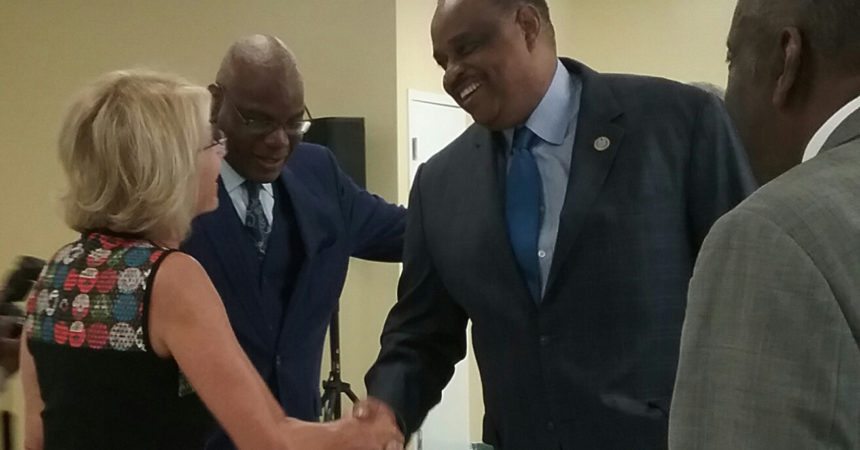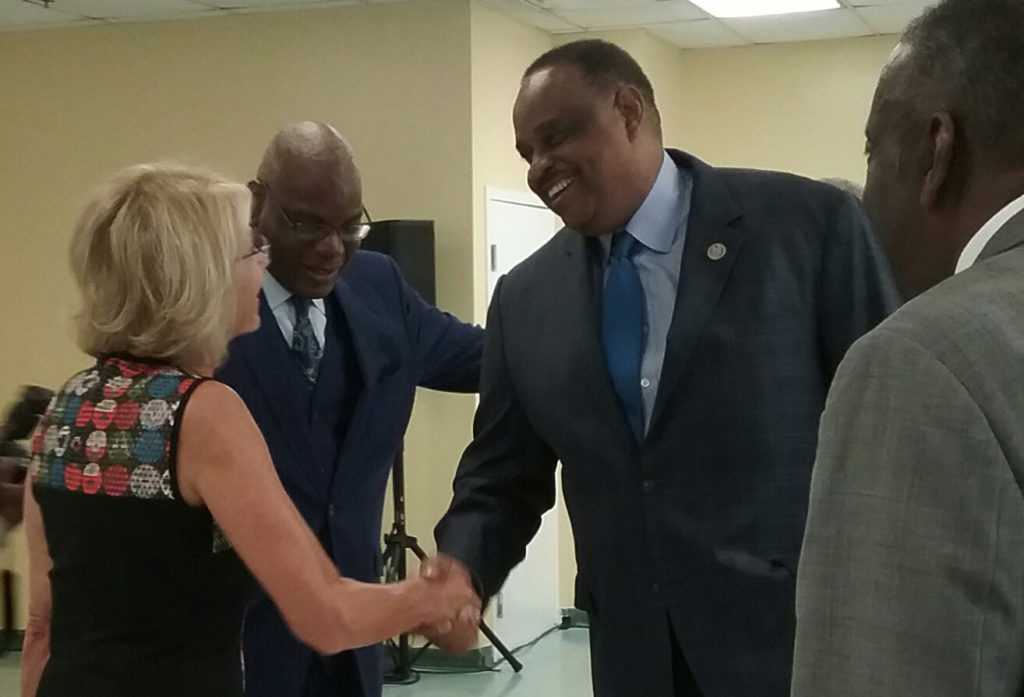
DeVos Calls for changes during education gathering

Congressman Al Lawson (right) and Rev. R. B. Holmes greet Secretary of Education Betsy DeVos prior to the start of a recent three-hour forum with educators at Bethel Christian Academy.
Photo by St. Clair Murraine
By Jim Saunders
The News Service of Florida
U.S. Secretary of Education Betsy DeVos gathered with about a dozen leaders of Florida business, higher-education and advocacy organizations to talk about reshaping the education system to offer more choices and to better prepare students for jobs.
DeVos, during a recent hour-long meeting in a conference room at the Florida Chamber Commerce, urged the leaders to “double down” on efforts to expand choices for students in kindergarten through 12th grade. DeVos has long been a major supporter of voucher programs and charter schools.
She pointed to the “notion that for too many years we’ve tried to have too many top-down approaches — be it from Washington or, in some cases, from the state level — to try to fit all children into one box.”
“I think we have a lot more creativity that can enter the K-12 system,” DeVos said. “I don’t like to refer to it as a system. It needs to be a system of options, a wide range of options, of approaches to education that we haven’t even really thought of yet because it has been, for the most part, such a closed industry. And I use that term very intentionally. It is a large industry.”
The warm reception at the meeting was a sharp contrast to criticism DeVos received Tuesday from the Florida Education Association teachers union and Democratic gubernatorial candidates as she toured a Tallahassee private school and a charter school. DeVos has been one of President Donald Trump’s most-controversial Cabinet appointments, at least in part because of her stances on issues such as school choice.
Democratic gubernatorial candidate Gwen Graham, for example, issued a statement saying “DeVos’ for-profit approach to public education is just flat-out wrong for Florida.”
During the meeting last Wednesday, DeVos urged a rethinking of the federal government’s role in the education system.
“I think that there’s been an outsized footprint in the last couple, three decades on the part of the federal government in education,” she said. “And it’s my goal to extract us from a lot of those spaces. I will welcome your thoughts on what we need to be doing less of. And if there are areas to be doing more of, what are those areas?”
DeVos spent a large chunk of the meeting listening to the participants who sat around a large rectangular table. Along with the Florida Chamber, they included officials from Gulf Power, JPMorgan Chase, the Holland & Knight law firm, Nemours Children’s Health System, Keiser University, the Independent Colleges and Universities of Florida, Tallahassee Community College, the Florida Children’s Council, The Able Trust and Lumina Foundation.
Mark Wilson, president and CEO of the Florida Chamber, and Stan Connally, president and CEO of Gulf Power, said that developing a talented workforce is critical for economic development in the state.
“In Florida, we believe that talent is replacing the tax incentive as the most important tool for economic developers,” Wilson said.
Some of the participants told DeVos about the importance of early-childhood education and developing reading skills at young ages.
“This really is a cradle to career conversation,” Connally said. “Education is cradle to career. (We’ve) learned so much about what happens in that cradle, about the number of words the child hears and how it influences their ability to learn.”
After the meeting at the Florida Chamber, DeVos held a roundtable discussion at Bethel Family Life Center in Tallahassee that was expected to include K-12 officials and leaders of Historically Black Colleges and Universities, according to the U.S. Department of Education.
During the Florida Chamber meeting, DeVos said she sees a need to have the K-12 and higher-education systems work better together.
“For too long, there have been real silos around that (higher education) work at the federal level. There’s very little interaction between those who work on K-12 policy and those who are working on higher-ed policy. I think that that has to change,” she said. “I think we also have to be much more intentional about communicating with students as early as middle school the wide range of options that they have to pursue beyond high school.
“I think we’ve done a disservice to young people for many years to suggest that they all have to go to a four-year college or university in order to be successful.”







